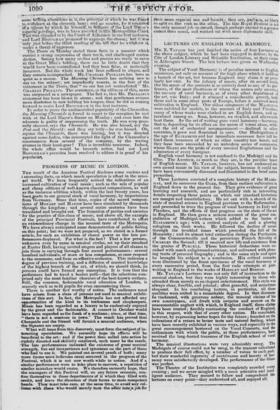PROGRESS OF MUSIC IN LONDON. '
THE result of the Amateur Festival discloses some curious and i nteresting facts, on which much speculation is afloat in the musi- cal world. We have frequently noticed the indications of an increased cultivation of vocal music ; such as the sale of popular and cheap editions of well-known classical compositions, as well as the immense addition which, within the last twenty years, has been4nade to our general stock of vocal harmony, by importations from Germany. Since that time, copies of the sacred composi-
tions of MOZART and HAYDN have been circulated by thousands through the kingdom; and several entire oratorios have been translated and brought out. The formation of parties and societies ' for the practice of this class of music, and above all, the example of the principal Provincial Festivals, have contributed to effect an extraordinary change in the musical taste of the Metropolis. We have always anticipated some demonstration of public feeling on this point; but we were not prepared, as we stated in a former article, for such an exhibition of choral power as the late per- formances displayed. For what is the fact ? That a few persons, unknown even by name in musical circles, set up their standard at Exeter Hall, having invited singers and players of all classes to join them in carrying through four sacred performances: several hundred individuals, of more or less competence, at once respond to the summons, and form an effective orchestra. This indicates a degree of previous training, and a diffusion of musical knowledge of the highest branch of the art, of which, we should think, no persons could have formed any conception. It is true that the performers had to tread a beaten path—that the selections com- prised only the most familiar choruses of the best-known authors. Still, the common, fashionable vocal education of London, is scarcely such as to fit pupils for even encountering these. There is another fact worthy of notice. The audiences must have arisen from a class of persons not used to musical exhibi- tions of this sort. In fact, the Metropolis has not afforded any opportunities of the kind to its tradesmen and shopkeepers. Music has been regarded as a luxury to be exclusively enjoyed by the great and the fashionable. A concert in October would have been regarded as the freak of a madman; since, at that time, 4' there is not a creature in town." The result has proved that Cheapside and the Strand will furnish a musical audience, when the Squares are empty.
What will issue from this discovery, must form the sebject of in- teresting speculation. We earnestly hope its effects will be beneficial to the art : and if the power thus called into action be rightly directed and skilfully employed, such must be the result. The late performances indicated the existence of great musical strength, but sad inexperience and ignorance on the part of those -who had to use it. We pointed out several proofs of both ; many more (some most ludicrous ones) occurred in the progress of the Festival, which it is not now worth while to notice. And if a similar performance were to take place to-morrow, a repetition of similar mistakes would ensue. We therefore earnestly hope, that the managers of this Festival will, on any future occasion, con- fine themselves to those departments of it which they filled with credit, and leave the direction of their forces to more competent bands. They must take care, at the same time, to avoid any col- lision with these who would merely turn the affair into_a job for
their more especial use and benefit they erei perhaas, as likely to split on this rock as the other. The late Royal Festival is not the only musical job on record, though perhaps carried to a greater extent than usual, and worked out with more diplomatic skill.




















 Previous page
Previous page